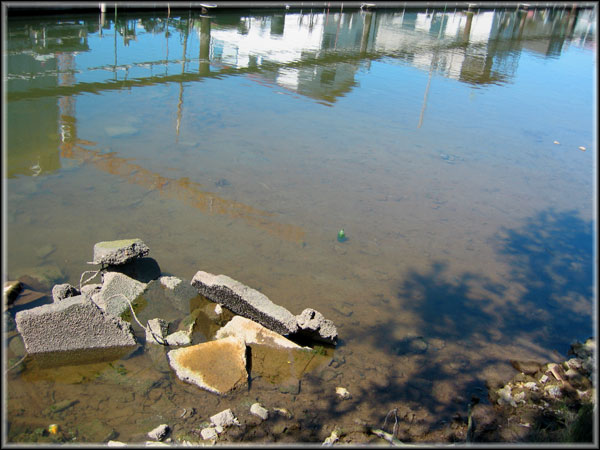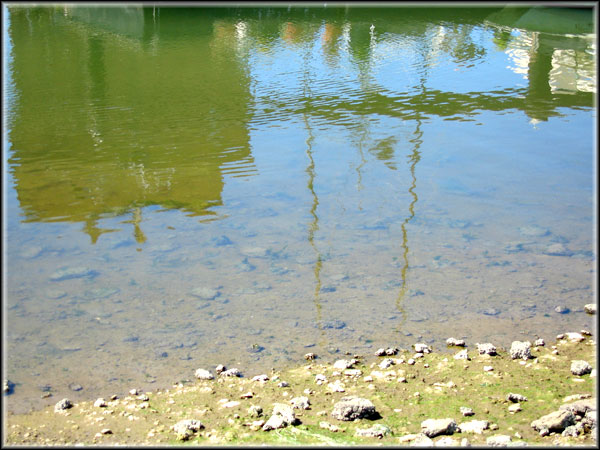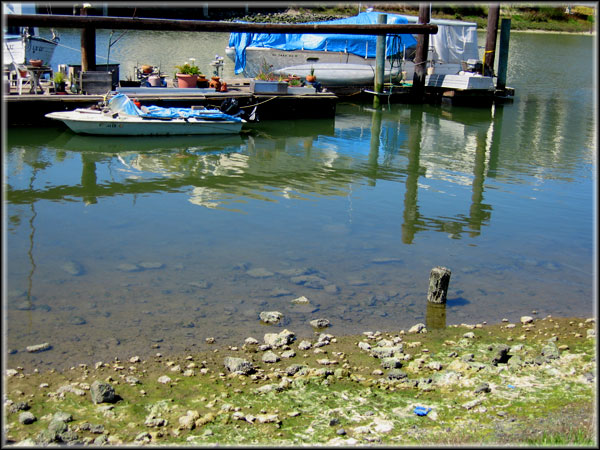Neptune in Pisces vs. The Virtue of Selfishness
8.28.12

Driving along San Francisco's Great Highway, which straddles the Pacific coast, you can't help but notice the sand-drifts blowing in across the pavement.
The ocean is in the process of reclaiming this slice of land from the governmental agencies who've served as its temporary custodians. Even as federal and local authorities scramble to combat this erosion through an ambitious master-plan, they know their efforts will only contain and delay the inevitable.
Our sea-levels are rising, and the wisest human interventionists are now strategizing our incremental, inevitable retreats from the coastline. Such large-scale ecological transition is beyond our grasp to halt, even by the most disciplined and driven dedicants. Its scope—just like its now-widely-accepted-as-manmade causal roots—is simply too large for any human individual to sufficiently contend with.
Meanwhile, as I write this, Tropical Storm Isaac is gathering strength in the Gulf of Mexico, threatening to land with fierce force along the same shores devastated by Hurricane Katrina in 2005… just one more instance of intensifying storm patterns also attributable to climate change, one more macro-level phenomenon we as a collective must confront with bold social initiative.
That Isaac initially appeared poised to collide with the Republican National Convention (RNC) in Tampa, FL—which ended up getting postponed a day, to minimize the storm's potential interference—presented an illustrative opportunity for critics of Republicans to gasp at the eerie irony of such an act-of-God's timing. Just as Republicans are rallying behind a presidential ticket and platform more vocally focused on smaller government and personal-achievement-based individualism (as opposed to, say, enterprising New-Deal-style social programs and a team spirit) than any in recent history, here arrives a meteorological example of what cannot be adequately tackled by an individualistic mindset, and instead requires governmental intervention on behalf of the greater social good.
The emotion behind this irony is only heightened as Isaac approaches the Gulf coast the same week as the 7th anniversary of Katrina, with its ugly memories of how the Bush administration failed in its efforts to care for the region's citizenry, treating them like criminals rather than emergency-victims, leaving them to wallow in filth or drown in floodwaters born of the breached levees, decrepit public works in dire need of government funds. Katrina's aftermath is a vivid reminder that our government not only doesn't look out for the needs of our least privileged, it actually turns against them in times of need.
I associate Neptune in Pisces (2011-2025) with the impending climate-change and sea-level-rise, not only because of the obvious influence of a watery planet in the water-sign of its modern rulership… but also due to its archetypal symbolism of that which interconnects us all, uncontained by meager sea-walls or ego-boundaries, and seeps into our sensitivities, susceptible as we all are to sympathetically suffering alongside fellow beings who suffer, in psychic solidarity with those who share this blessed existence with us.
Neptune in Pisces celebrates our indivisible interdependence (rather than lamenting how our ego-driven individualism is held back by oh-so-annoying concern for others' well-being), inspiring us to pursue idealistic, universal solutions that don't cut off any proverbial noses, just to spite the faces of our own populace. That's why Neptune's current trip through Pisces is so well-timed: to hopefully soften the harshness of the Uranus-Pluto square with a touch of compassion.
 If Neptune in Pisces unites us, in part, through more immediately exposing us to the emotional suffering that others feel, it does not stop at painful feelings. Likewise, we share in the great triumphs our universal brothers and sisters attain. We share their triumphant emotions—and, yes, perhaps we also share a bit of the credit. Nobody exists in a vacuum. We profoundly impact each other's development into capable individuals, as parents and children, siblings and friends, teachers and bosses, leaders and clergy. We evolve as a result of the specific privileges we are gifted with, and in the face of the special challenges we must face, influences we inherit then respond to with our free will. And we individually put forth our creative contributions using the many raw materials, items, ideas, institutions and delivery-methods already put forth by other individuals… never, never, ever 'by ourselves'.
If Neptune in Pisces unites us, in part, through more immediately exposing us to the emotional suffering that others feel, it does not stop at painful feelings. Likewise, we share in the great triumphs our universal brothers and sisters attain. We share their triumphant emotions—and, yes, perhaps we also share a bit of the credit. Nobody exists in a vacuum. We profoundly impact each other's development into capable individuals, as parents and children, siblings and friends, teachers and bosses, leaders and clergy. We evolve as a result of the specific privileges we are gifted with, and in the face of the special challenges we must face, influences we inherit then respond to with our free will. And we individually put forth our creative contributions using the many raw materials, items, ideas, institutions and delivery-methods already put forth by other individuals… never, never, ever 'by ourselves'.
This is what President Obama was getting at last month when, during a campaign stop, he uttered this controversial comment: 'Somebody helped to create this unbelievable American system that we have that allowed you to thrive. Somebody invested in roads and bridges. If you've got a business—you didn't build that. Somebody else made that happen.' Though Obama obviously intended this as a statement endorsing infrastructural investment (and obviously could have phrased it much better), his critics quickly latched onto it as an indicator of anti-entrepreneurial beliefs, as if Obama's acknowledgment of our collective successes must undermine or negate our individual achievements. The Romney campaign is now selling 'I built this' T-shirts.
Romney's focus on personal success brings to mind his running-mate Paul Ryan's widely-reported-upon fandom of philosopher Ayn Rand (both Aquarians, incidentally), who made a name for herself by passionately advocating for 'the virtue of selfishness' (as she titled her 1964 collection of essays) and critiquing altruism (which she considers incompatible with reason, individual rights, freedom and capitalism). Ryan credits Rand's work as imbuing him with the spirit of public service, as well as influencing his austere-yet-laissez-faire economic-policy ideologies, which have become his public calling-card, making him a hero to the Tea Party right.
Neptune in Pisces cannot stomach such valorization of selfishness as an ideal… particularly not when it comes to structuring government, a body whose job, by definition, it is to attend to collective needs. Neptune might counter by asserting that our very separation into discrete 'selves' is an earthly illusion, concealing the reality of us as a single living universe. Of course, the atheist Rand could easily dismiss such thinking as mystical mumbo-jumbo, which flagrantly flies in the face of rational self-serving reason by suggesting we should ever make sacrifices that don't directly benefit us. Neptune, meanwhile, will happily dispense with reason: The heartful of feelings, which overflows with universal love, is a reliable enough guide to assist us in striving to both alleviate others' hurt and maximize their happiness. The resultant good-feelings, pride and gratitude, only beget more of the same.
So, on the eve of the RNC in Tampa and one more Gulf-coast hurricane hitting land, we are left to weigh reason against altruism. 'Every man for himself' against 'we're all in this together'. The Virtue of Selfishness versus Neptune in Pisces. When Katrina struck New Orleans on August 29, 2005, transiting Uranus was at 8 degrees Pisces, exactly conjunct Pluto in the birthchart for the city's incorporation. This week, as we hold our collective breath and pray for the best, we wax toward Friday's (Aug 31) full moon at this exact degree of the zodiac—8 Pisces. Should Isaac land with a similar force to Katrina, whether in a still-damaged-ward of poverty-stricken New Orleans or at a gathering of the country's most powerful Republicans in Tampa, an entire community would be affected: young and old, rich and poor, black and white, selfish and altruistic. Acts-of-God, as we call them, are always the great levelers.
Now, as our planet warms and our oceans rise and our storms worsen, if only we could grow to see our entire lives as one continuous 'act-of-God' (and isn't it?)… would that be enough to engender the unity required for us to collectively adapt, in time to dodge catastrophe?
Further reading:
'The Ethics of Emergencies' by Ayn Rand (from The Virtue of Selfishness)



